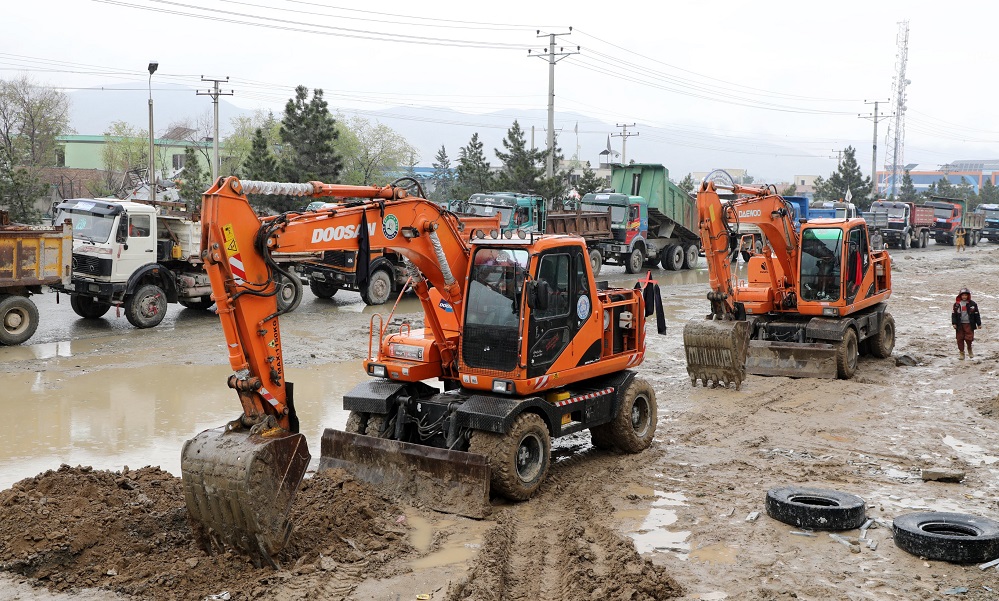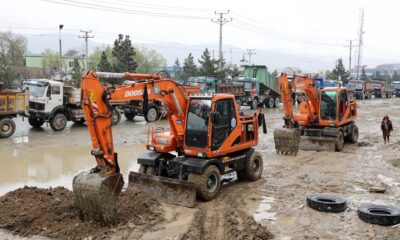Latest News
Sept. 11 victims cannot seize Afghan central bank assets: US judge

A US judge decided on Tuesday that victims of the Sept. 11, 2001, attacks are not entitled to seize $3.5 billion of assets belonging to Afghanistan’s central bank to satisfy court judgments they obtained against the Islamic Emirate of Afghanistan (IEA), Reuters reported.
US District Judge George Daniels in Manhattan said he was “constitutionally restrained” from finding that the IEA was Afghanistan’s legitimate government, a precursor for attaching assets belonging to Da Afghanistan Bank, or DAB.
Daniels said letting victims seize those assets would amount to a ruling that the IEA are Afghanistan’s legitimate government.
He said US courts lack power to reach that conclusion, noting that Biden administration does not recognize the IEA as Afghanistan’s government, read the report.
“The judgment creditors are entitled to collect on their default judgments and be made whole for the worst terrorist attack in our nation’s history, but they cannot do so with the funds of the central bank of Afghanistan,” Daniels wrote.
“The Taliban [Islamic Emirate of Afghanistan] – not the former Islamic Republic of Afghanistan or the Afghan people – must pay for the IEA’s liability in the 9/11 attacks,” he added.
Daniels’ decision is a defeat for four groups of judgment creditors that claimed some of the $7 billion of DAB funds that had been frozen at the Federal Reserve Bank in New York, Reuters reported.
“This decision deprives over 10,000 members of the 9/11 community of their right to collect compensation from the Taliban [IEA],” said Lee Wolosky, a lawyer for one creditor group known as the Havlish plaintiffs. “We believe it is wrongly decided and will appeal.”
The other creditor groups are also planning an appeal, a separate Tuesday court filing shows, read the report.
In an executive order last February, US President Joe Biden ordered $3.5 billion of the DAB funds set aside to benefit the Afghan people.
Last September, the US Treasury said it would move that money to a Swiss-based trust beyond the IEA’s reach.
NOT THE IEA’S MONEY
The creditor groups had sued many defendants, including al-Qaeda, over the Sept. 11 attacks, and obtained default judgments after the defendants failed to show up in court, Reuters reported.
At the time of the attacks, the Islamic Emirate of Afghanistan (IEA) had allowed al-Qaeda to operate within Afghanistan.
The United States ousted the IEA and al-Qaeda in late 2001, but the IEA returned to power in 2021 when Western forces pulled out of the country.
In his 30-page decision, Daniels adopted findings of US Magistrate Judge Sarah Netburn, who last August also recommended no recovery for the creditor groups.
Daniels said he lacked jurisdiction over DAB under federal law because the bank was an instrumentality of a foreign government and thus had immunity.
He also said Afghanistan, as opposed to the IEA, neither qualified as a “terrorist party” nor had been designated a state sponsor of terrorism, read the report.
“Neither the Taliban [IEA] nor the judgment creditors are entitled to raid the coffers of the state of Afghanistan to pay the Taliban’s debts,” Daniels wrote.
Other countries recently held about $2 billion of Afghan reserves, Reuters reported.
Nearly 3,000 people died on Sept. 11, 2001, when planes were flown into New York’s World Trade Center, the Pentagon in northern Virginia, and a Pennsylvania field.
US sanctions ban doing financial business with the IEA but allow humanitarian support for the Afghan people.
The case is in re Terrorist Attacks on Sept. 11, 2001, US District Court, Southern District of New York, No. 03-md-01570, Reuters reported.
Latest News
Three road construction projects launched in Kabul

Three road construction projects worth about one billion Afghanis started in capital Kabul on Saturday.
The projects were inaugurated by Deputy Prime Minister for Economic Affairs Mullah Abdul Ghani Baradar.
The projects are: the second phase of Kotal Khairkhane road, the first part of the Shahid square to Qasaba, and the Airport road to Gumruk.
In the inauguration ceremony, Mullah Baradar said that Kabul municipality is working hard to beautify and regulate the city, and people should cooperate with the government in protecting public benefit projects.
He directed the officials of Kabul municipality to complete the mentioned projects on time and with good quality.
The second phase of Kotel Khairkhaneh road is 2.5 kilometers long and 60 meters wide. Thie road will cost 364 million Afghanis and will be completed in 20 months.
The Shahid square-Qasaba road is 1.8 kilometers long and 45 meters wide, which will be built at a cost of 175 million Afghanis in one year.
The Airport-Gumruk road is 2.7 km long and 60 meters wide, which will be completed at a cost of 407 million Afghanis in 20 months.
The projects are funded by Kabul Municipality.
Latest News
Russian defense minister says main threat for SCO countries emanates from Afghanistan

Russian Defense Minister Sergey Shoygu said on Friday that the main threat for the Shanghai Cooperation Organization (SCO) members emanates from Afghanistan where international terrorist groups find shelter due to unstable and indefinite political situation.
Speaking at a meeting of the SCO defense ministers in Kazakhstan’s capital Astana, Shoygu said Washington has stepped up efforts to restore its positions in Central and South Asia that were lost after the withdrawal of coalition troops from Afghanistan, Anadolu Agency reported.
The military chief called “unacceptable” the deployment of the American military infrastructure in the region, arguing that intentions should be regarded as “a direct threat to stability in the SCO space.”
According to him, the US is trying to impose a new security system in the Asia-Pacific region for dominance.
This comes as the Islamic Emirate has repeatedly emphasized that it does not allow anyone to pose threats to any other country from Afghanistan soil.
Recently, Mohammad Yaqub Mujahid, Acting Minister of National Defense Mohammad Yaqub Mujahid said that no destructive groups including Daesh have physical presence in Afghanistan,
Latest News
IEA calls Mujahideen Victory Day ‘freedom day’

In a statement on the occasion of the 32nd anniversary of the victory of the Mujahideen against the then communist government, the Islamic Emirate said that it is a day of freedom of the Afghan nation.
The Islamic Emirate described the coup by People’s Democratic Party of Afghanistan on 27th April 1978 as a dark day in history, as a result of which the people of Afghanistan suffered severe human and financial losses.
The statement said that the Afghan nation suffered huge casualties in their 14-year struggle against the thoughts and actions of the communists, as 1.5 million people died and millions more faced various hardships.
“After 20 years of Jihad, our country was freed from another occupation and the Islamic system was established, so the Islamic Emirate will make its utmost efforts so that the fruits of decades of sacrifice and struggle of this nation are not wasted,” the statement said.
“It was the wish of the martyrs to fully implement the Islamic system in the country, and therefore, the Islamic Emirate is trying to facilitate development and prosperity under the shadow of the Islamic system in order to realize the goals of the Afghan people’s jihads,” it added.
-

 Latest News4 days ago
Latest News4 days agoRashid Khan named AWCC’s brand ambassador
-

 World4 days ago
World4 days agoMalaysian navy helicopters collide in mid-air, 10 killed
-

 Sport4 days ago
Sport4 days agoJaiswal ton powers Rajasthan to big IPL win
-

 World3 days ago
World3 days agoNorth Korea officials visit Iran in a rare public trip
-

 Sport4 days ago
Sport4 days agoMawj Sahil player scores stunning halfway line goal in 1-0 win over Jawanan Wahedi
-

 Latest News4 days ago
Latest News4 days agoAt least 1,500 families affected by recent floods: IRW
-

 Sport3 days ago
Sport3 days ago‘Serious talent’ Fraser-McGurk bonds with Warner to light up IPL
-

 Latest News4 days ago
Latest News4 days agoUS report cites ‘significant deterioration’ in Afghan women’s rights last year
























